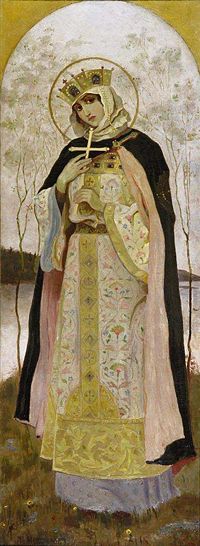Olga of Kiev
- Born: Abt 890
- Marriage (1): Igor Grand Prince of Kiev
- Died: 11 Jul 969, Kiev, Ukraine about age 79
Other names for Olga were Saint Olga of Kiev and Olga Prekrasa.
Research Notes:
Source: Wikipedia - Igor, Grand Prince of Kiev
From Wikiepdia - Olga of Kiev :
Saint Olga (Russian and Ukrainian : also called Olga Prekrasa ( or Olga the Beauty, Old Norse : Helga; born c. 890 died July 11 , 969 , Kiev ) was a Pskov woman of Varangian extraction who married the future Igor of Kiev , arguably in 903 . The Primary Chronicle gives 879 as her date of birth, which is rather unlikely, given the fact that her only son was probably born some 65 years after that date. After Igor's death, she ruled Kievan Rus as regent (945 -c. 963 ) for their son, Svyatoslav .
At the start of her reign, Olga spent great effort to avenge her husband's death at the hands of the Drevlians , and succeeded in slaughtering many of them and interring some in a ship burial , while still alive. She is reputed to have scalded captives to death and another, probably apocryphal, story tells of how she destroyed a town hostile to her. She asked that each household present her with a dove as a gift, then tied burning papers to the legs of each dove which she then released to fly back to their homes. Each avian incendiary set fire to the thatched roof of their respective home and the town was destroyed. More importantly in the long term, Olga changed the system of tribute gathering (poliudie ) in what may be regarded as the first legal reform recorded in Eastern Europe.
She was the first Rus ruler to convert to Christianity , either in 945 or in 957 . The ceremonies of her formal reception in Constantinople were minutely described by Emperor Constantine VII in his book De Ceremoniis . Following her baptism she took the Christian name Yelena, after the reigning Empress Helena Lekapena. The Slavonic chronicles add apocryphal details to the account of her baptism, such as the story how she charmed and "outwitted" Constantine and how she spurned his matrimonial proposals. In truth, at the time of her baptism, Olga was an old woman, while Constantine had a wife.
Seven Latin sources document Olga's embassy to Emperor Otto I in 959 . The continuation of Regino of Prüm mentions that the envoys requested the Emperor to appoint a bishop and priests for their nation. The chronicler accuses the envoys of lies, commenting that their trick was not exposed until later. Thietmar of Merseburg says that the first archbishop of Magdeburg , before being promoted to this high rank, was sent by Emperor Otto to the country of the Rus (Rusciae) as a simple bishop but was expelled by pagans. The same data is duplicated in the annals of Quedlinburg and Hildesheim , among others.
Olga was one of the first people of Rus to be proclaimed saint, for her efforts to spread the Christian religion in the country. However, she failed to convert Svyatoslav , and it was left to her grandson and pupil Vladimir I to make Christianity the lasting state religion . During her son's prolonged military campaigns, she remained in charge of Kiev, residing in the castle of Vyshgorod together with her grandsons. She died soon after the city's siege by the Pechenegs in 968 .
Olga married Igor Grand Prince of Kiev. (Igor Grand Prince of Kiev died in 945.)
|
